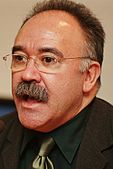
Back Eleccions generals espanyoles de 2004 Catalan Parlamentswahl in Spanien 2004 German Elecciones generales de España de 2004 Spanish 2004ko Espainiako hauteskunde orokorrak Basque Espanjan parlamenttivaalit 2004 Finnish Élections générales espagnoles de 2004 French Eleccións xerais de España de 2004 Galician Elezioni generali in Spagna del 2004 Italian 2004年スペイン総選挙 Japanese Spaanse parlementsverkiezingen 2004 Dutch
| |||||||||||||||||||||||||||||||||||||||||||||||||||||||||||||||||||||||||||||||||||||||||||||||||||||
All 350 seats in the Congress of Deputies and 208 (of 259) seats in the Senate 176 seats needed for a majority in the Congress of Deputies | |||||||||||||||||||||||||||||||||||||||||||||||||||||||||||||||||||||||||||||||||||||||||||||||||||||
|---|---|---|---|---|---|---|---|---|---|---|---|---|---|---|---|---|---|---|---|---|---|---|---|---|---|---|---|---|---|---|---|---|---|---|---|---|---|---|---|---|---|---|---|---|---|---|---|---|---|---|---|---|---|---|---|---|---|---|---|---|---|---|---|---|---|---|---|---|---|---|---|---|---|---|---|---|---|---|---|---|---|---|---|---|---|---|---|---|---|---|---|---|---|---|---|---|---|---|---|---|---|
| Opinion polls | |||||||||||||||||||||||||||||||||||||||||||||||||||||||||||||||||||||||||||||||||||||||||||||||||||||
| Registered | 34,571,831 | ||||||||||||||||||||||||||||||||||||||||||||||||||||||||||||||||||||||||||||||||||||||||||||||||||||
| Turnout | 26,155,436 (75.7%) | ||||||||||||||||||||||||||||||||||||||||||||||||||||||||||||||||||||||||||||||||||||||||||||||||||||
| |||||||||||||||||||||||||||||||||||||||||||||||||||||||||||||||||||||||||||||||||||||||||||||||||||||
 Election results by Congress of Deputies constituency | |||||||||||||||||||||||||||||||||||||||||||||||||||||||||||||||||||||||||||||||||||||||||||||||||||||
| |||||||||||||||||||||||||||||||||||||||||||||||||||||||||||||||||||||||||||||||||||||||||||||||||||||
The 2004 Spanish general election was held on Sunday, 14 March 2004, to elect the 8th Cortes Generales of the Kingdom of Spain. All 350 seats in the Congress of Deputies were up for election, as well as 208 of 259 seats in the Senate.
The electoral outcome was heavily influenced by the aftermath of the Madrid train bombings on 11 March, as a result of which all parties suspended their electoral campaigns.[1] For two days following the attacks, the People's Party (PP) government kept blaming the terrorist organization ETA for the bombings, even in spite of mounting evidence suggesting the involvement of Islamist groups. The government was accused of misinformation, as an Islamist attack would have been perceived as the direct result of Spain's involvement in the Iraq War, which had been highly unpopular among the public.[2][3]
The election result was described by some media as an "unprecedented electoral upset". The perceived abuse of the PP's absolute majority throughout the legislature, with a focus on Spain's involvement in Iraq, was said to have helped fuel a wave of discontent against the incumbent ruling party, with the government's mismanagement on the bombings serving as the final catalyst for change to happen.[4][5] At 11 million votes and 42.6%, the opposition Spanish Socialist Workers' Party (PSOE) increased by 3.1 million its 2000 result, securing 164 seats—a net gain of 39. In contrast, the PP, which opinion polls earlier in the year had predicted would secure a diminished but still commanding victory, lost 35 seats and 7 percentage points, resulting in the worst defeat for a sitting government in Spain up to that point since 1982. The 75.7% turnout was among the highest since the Spanish transition to democracy, with no future general election having exceeded such a figure. The number of votes cast, at 26.1 million votes, remained the highest figure in gross terms for any Spanish general election until the April 2019 election.[6][7]
The day after the election, Zapatero announced his will to form a minority PSOE government, supported by other parties in a confidence and supply basis. Two minor left-wing parties, Republican Left of Catalonia (ERC) and United Left (IU), immediately announced their intention to support Zapatero's government. On 16 April 2004, Zapatero was elected as new prime minister by an outright majority of the new Congress, with 183 out of 350 members voting for him, being sworn in the next day.[8]
Cite error: There are <ref group=lower-alpha> tags or {{efn}} templates on this page, but the references will not show without a {{reflist|group=lower-alpha}} template or {{notelist}} template (see the help page).
- ^ "Los partidos suspenden la campaña electoral" (in Spanish). Cadena SER. 11 March 2004. Retrieved 28 January 2019.
- ^ "Protestas en las sedes del PP por los atentados del 11M" (in Spanish). RTVE. 13 March 2004. Retrieved 28 January 2019.
- ^ "El 91% de los españoles rechaza la intervención militar en Irak, según el CIS". El País (in Spanish). 28 March 2003. Retrieved 28 January 2019.
- ^ "El voto de castigo dio la victoria al PSOE, según la prensa". El País (in Spanish). 15 March 2004. Retrieved 28 January 2019.
- ^ "Zapatero atribuye su victoria a las "ganas de cambio en España" y no al atentado del 11-M". El País (in Spanish). 16 March 2004. Retrieved 28 January 2019.
- ^ "El PSOE da el gran vuelco electoral". El País (in Spanish). 15 March 2004. Retrieved 28 January 2019.
- ^ "Zapatero vence con casi 11 millones de votos". El País (in Spanish). 15 March 2004. Retrieved 28 January 2019.
- ^ "Zapatero, investido presidente del Gobierno con mayoría absoluta". ABC (in Spanish). 16 April 2004. Retrieved 28 January 2019.





